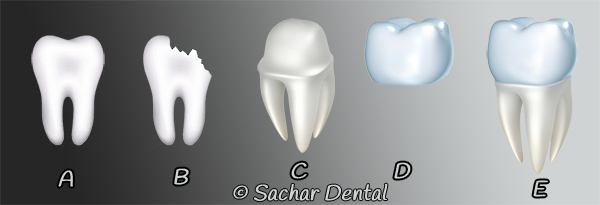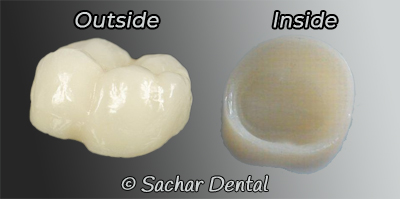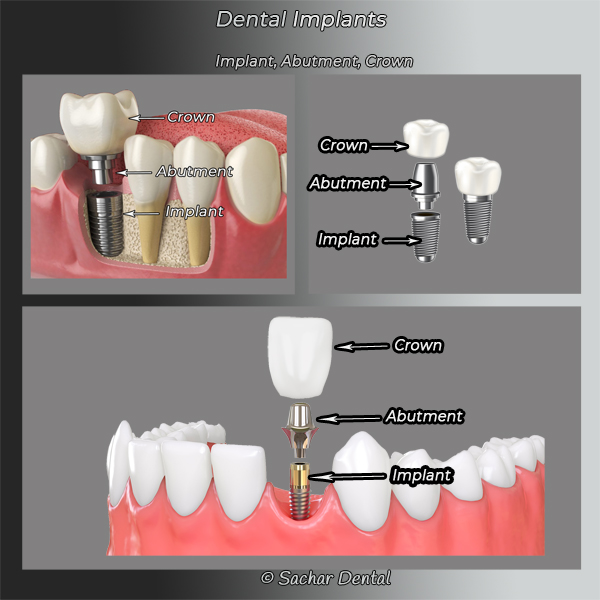Sachar Dental NYC
For SAME day / emergency appointments
Call (212) 752-1163
All the below content has been written by NYC Dentist, Dr. Sandip Sachar.
Dentist NYC for Dental Crowns
On this page: (Click topic below)
- What is a crown?
- Why would I need crown?
- How is a crown made?
- What material is a crown made of?
- How is a crown inserted into my mouth?
- How long should a crown last?
- What should I do if my old crown falls out?
- Can I get a cavity or tooth decay under my crown?
- What is the difference between a crown and an implant crown?
- Do I need a crown if I had a root canal?
- How much does a crown cost?
- Will my dental insurance pay for a crown?
- Why are we the best dentists in NYC for crowns?
Are a dental cap and a dental crown the same thing?
A “dental crown” and a “dental cap” for a tooth are the same thing.
What is a dental crown?
A dental crown is a cap that is placed over a tooth that is damaged due to either decay or trauma. For example, when you have a dental cavity, part of your tooth is eroded or destroyed. When the cavity is too large to be repaired with just a simple dental filling or bonding, a dental crown may be necessary. A dental crown is custom fabricated in a dental laboratory to fit the exact shape and size of the tooth being crowned. It restores the shape, function, strength and appearance of the original tooth. A dental crown covers the whole tooth.
A dental crown is made of porcelain or porcelain layered over metal. At Sachar Dental NYC, we always use the least toxic dental materials possible. When it comes to our dental crowns, we only use porcelain or porcelain layered over precious metals. We do not use non-precious metals in our practice, which are still commonly used in other offices. Our dental crowns may cost us more to make in a dental laboratory, but we do not pass these costs on to our patients.

In the above picture:
- Diagram A represents a healthy tooth.
- Diagram B represents a decayed, or broken tooth.
- Diagram C is a representation of the tooth after the decayed part was removed, and the remaining tooth has been shaped and prepared to receive a crown.
- Diagram D is the porcelain dental crown that has been custom fabricated in a dental laboratory.
- Diagram E is the prepared tooth with a crown permanently bonded on it.

In the above picture:
- This is a porcelain dental crown.
- The inside is hollow to go over the remaining natural tooth and cover it.
- The outside is shaped like the original tooth.
- It is permanently bonded to the tooth.
Why would I need dental crown?
A patient may need a dental crown when a tooth is damaged due to trauma or extensive tooth decay. When the damaged area of the tooth, is large enough that it can not be restored with a simple dental filling, the next step is to place a dental cap or dental crown. The dental crown covers the whole tooth and restores the tooth to its original shape, strength and function. A dental crown may be necessary for any of the following:
- Broken or fractured teeth
- Decayed teeth with extensive tooth decay
- Fractured fillings that are large
- Large cavities
- A tooth that has had a root canal
- An old crown that has failed
How is a dental crown made?
When a patient needs a dental crown, the first step is to prepare the damaged tooth to accept the crown. A numbing gel and local anesthetic is used in the area to ensure patient comfort. Then any necrotic or decayed part of the tooth is removed and the tooth is cleaned. It is then filed to shape the tooth to be able to receive a dental crown and be bonded on permanently. After the tooth has been shaped, a mold is made of the prepared tooth. We send the mold of the tooth to our dental laboratory. A temporary crown is placed over the prepared tooth to seal and protect the tooth from further decay, further breakage and from sensitivity. This temporary covers the prepared tooth until the permanent dental crown is back from the laboratory. This is usually one week. The dental crown is custom made in our dental laboratory from the mold of your tooth to fit exactly over the prepared tooth. We specify what materials and color to make the dental crown. The end result will cap the tooth to restore the original shape, function, strength and appearance. This dental crown is then permanently bonded over the tooth. The crown is adjusted to ensure a comfortable bite.
At Sachar Dental NYC, our dentists are experts in dental crown procedures. Our goal is to make the dental crown function properly, restore the original shape of the tooth, restore the appearance of the tooth and be aesthetically pleasing.
What material is a dental crown made of?
When we order a dental crown to be fabricated in our dental laboratory, we specify what material to make it out of. We take into consideration the functional needs and the patient’s anesthetics. We have multiple dental materials to choose from. We use our expertise and experience when choosing the right material for each individual case. As with everything at Sachar Dental NYC, we always use the least toxic materials possible. We only use top-of-the-line porcelains and precious metals to fabricate our dental crowns. We do not ever use nickel or any cheaper non-precious metals in any of our crowns.
How is a dental crown inserted into my mouth?
When a patient is ready to get the permanent dental crown inserted, the temporary crown is removed. Anesthesia is utilized for patient comfort. The tooth is thoroughly cleaned to remove any bacteria and plaque. The permanent dental crown is assessed to ensure it lines up with the underlying tooth properly. Assuming no modification is needed, the dental crown is permanently bonded into place. This visit takes about 30-45 minutes for the dental crown to become permanently bonded.
What to expect after a dental crown procedure?
On your first visit, you will receive a temporary crown. You will be instructed to not eat anything until the anesthesia wears off. We then advise patients to avoid chewing on the affected side as much as possible until you return at your next visit to place the permanent crown.
On your second visit, immediately after receiving the permanent dental crown, the doctor will give you instructions. Depending on what material is used to bond the dental crown to the tooth, you may be instructed to not eat on that side from anywhere from 1 hour to 24 hours. If anesthesia was utilized, you will be instructed to wait until the anesthesia wears off before you can eat. Normally, there will be no pain or discomfort after the crown is placed. The crown will be evaluated next at your normal biannual dental checkup.
How long should a dental crown last?
Under normal circumstances, a dental crown should last up to 15 years or more. In some patients that are clenchers or grinders, they may damage the dental crown, and may shorten the life of the dental crown, requiring the need for a replacement crown. For patients that grind their teeth, we recommend a nightguard to protect the crown.
What should I do if my dental crown does not feel right?
If you feel discomfort or problems with a dental crown, we advise you to come in for an evaluation. On the evaluation, we will examine the dental crown to make sure it is not loose, or have any other problems. We will take x-rays to look for any problems under the crown, or for problems with the nerve under the crown. The biting surface will also be evaluated to ensure that it is even.
What should I do if my old dental crown falls out?
If your dental crown falls out, we advise you to come in as soon as possible for evaluation. We recommend that you leave crown out of your mouth due to a risk of swallowing the crown or choking on it. Without the crown, the tooth is exposed to further decay and damage and should be assessed as soon as possible. When you come in for an evaluation, the first step is to assess why the old crown fell out. By identifying the underlying problem, we are able to address the cause so that we can then prevent the fixed or replaced crown from falling out again in the future. When we perform our assessment, will determine if the original dental crown is able to be used again. If it is, we will permanently bond it back in place. If there is decay underneath the crown, the tooth will need to be filed again to remove any decayed part. A new mold will be taken and sent to our dental laboratory. A new dental crown will need to be fabricated to fit the new shape of the tooth. The patient will follow-up to have the new crown bonded into place.
Can I get a dental cavity or tooth decay under my dental crown?
Normally, a crown is able to fully seal the tooth and prevent further decay. However, if plaque is allowed to build up along the root of the tooth, and is not cleaned by brushing and flossing, new tooth decay can occur underneath the crown. If this happens, the crown may need to be removed and the remaining tooth will need to be filed again to remove the decayed area. Once all of the decay is removed, assuming there is enough tooth left, a new mold will be taken, and a new dental crown will be fabricated and placed.
What is the difference between a dental crown and a dental implant crown?
A dental crown and dental implant crown, are essentially the same thing. The difference is what is underneath the crown, and what the crown is attached to. The dental crown by itself, as described above, is bonded to a tooth whereas an implant crown is bonded to a dental implant and abutment. When a tooth has extensive decay, and the tooth cannot be saved, the whole tooth may have to be removed. When the tooth is removed, a dental implant is placed into the bone. After the dental implant heals, an abutment is placed on top of the implant. The dental implant crown is then placed on top of, and attached to the abutment. For more information and dental implants, please see our dental implant page.

Do I need a dental crown if I had a root canal?
Not every tooth that has undergone a root canal procedure needs a dental crown. Many root canaled teeth do need a crown, but not all. We will determine how much of the natural tooth remains after a root canal procedure is performed. If there is enough tooth remaining to be functional, then a permanent filling is utilized. If there is not enough of the tooth remaining to function normally, then a crown is placed. At Sachar Dental NYC it is our goal to preserve as much of a natural tooth as possible.
How to maintain a dental crown?
After receiving a dental crown, home care does not change. We still recommend brushing twice a day and flossing daily. We also still recommend coming in twice a year for your regular dental checkups and professional dental teeth cleanings. If you clench or grind your teeth, we may recommend you wear a night guard to protect your dental crown.
How much does a dental crown cost in NYC?
At Sachar Dental NYC, we have a one-time fee of $1,600 for a regular dental crown. This includes all visits related to the dental crown. It will be a minimum of 2 visits. Our cost includes reshaping the tooth to remove the decay, and to take a mold on the first visit. We will also place a temporary crown on the first visit. On the subsequent visit, the permanent dental crown will be checked to ensure its fit, and permanently bonded to your tooth. This visit is also included in our one-time cost. Our cost also includes all follow-up visits related to the dental crown. Most PPO dental insurance plans will cover this cost of a dental crown at 50-80%. We will submit the claim to your insurance company for you and collect insurance portion from them directly. We will only charge you for your percentage on the day of your visit. We will give you an estimate of your portion of the bill before the procedure.
Will my dental insurance pay for a dental crown?
Most PPO dental insurance plans cover the cost of a dental crown at 50-80%. Prior to coming into Sachar Dental NYC, we always check on your dental insurance benefits and inform you as to what your total out-of-pocket costs will be before performing this procedure, or any procedure. You will only be responsible for your percentage of the costs at the time of your visit. We will then submit an insurance claim to your insurance company, and collect payment from them directly for their portion.
Can I use flexible spending dollars for a dental crown?
Yes, you can use your medical savings accounts or flexible spending dollars to cover charges related to your dental treatment. At the time of your service, we will provide you with all the necessary documentation and receipts.
Do you offer payment plans for dental treatment at Sachar Dental NYC?
At Sachar Dental NYC, we offer interest free financing through Lending Club and Care Credit. In 15 minutes, we will let you know if you are approved for interest-free financing. These options will enable you to make payments over the next 12-18 months without any interest charged.
Why are we the best dentists in NYC for dental crowns?
At Sachar Dental NYC, we always use the most conservative approach and least invasive procedures to solve the problem present. This applies to our dental crowns, as well as all other dental problems that we treat. We only perform a dental crown procedure when it is absolutely necessary. We will determine if there is enough native tooth structure remaining for strength and whenever possible we will use a dental filling or bonding to solve the problem. Whenever possible we will opt for a three-quarter crown or Inlay or Onlay rather than a full dental crown, in order to preserve as much natural healthy tooth as possible.
Additionally, after a root canal procedure done at Sachar Dental NYC, we evaluate whether or not you need a dental crown. We will determine if enough of the original tooth remains such that it will be able to function properly. In this case, we will put in a permanent filling or bonding in the tooth to seal it, and a crown may not be necessary.
Also, as always at Sachar Dental NYC, we use always the least toxic materials possible. We do not use any non-precious metals in our crowns. We only use the top-of-the-line porcelains and precious metals when needed. We only use the best dental laboratories in New York City. We may pay more for premium materials, however, we do not pass this cost onto our patients.
And finally, when dental crowns are more complicated, we have a prosthodontist specialist with over 20 years of experience in our office to handle these more complex cases.


